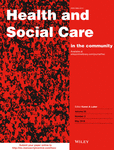Multidisciplinary perspectives: Application of the Consolidated Framework for Implementation Research to evaluate a health coaching initiative
Funding information
Data collection was funded by Newham Community Education Provider Network.
Abstract
Long-term conditions are a leading cause of mortality and morbidity. Their management is founded on a combination of approaches involving government policy, better integration between health and care systems, and individual responsibility for self-care. Health coaching has emerged as an approach to encouraging individual responsibility and enhancing the self-management of long-term conditions. This paper focuses on the evaluation of a workforce initiative in a diverse and socially deprived community. The initiative sought both to improve integration between health and care services for people with long-term conditions, and equip practitioners with health coaching skills. The aim of the study was to contribute an empirical understanding of what practitioners perceive to be the contextual factors that impact on the adoption of health coaching in community settings. These factors were conceptualised using the Consolidated Framework for Implementation Research (CFIR). A stratified purposive sample of 22 health and care practitioners took part in semi-structured telephone interviews. Data were analysed using the CFIR as an analytical framework. The perceptions of trainees mapped onto the major domains of the CFIR: characteristics of the intervention, outer setting, inner setting, characteristics of individuals involved and process of implementation. Individual patient expectations, comorbidities and social context were central to the extent to which practitioners and patients engaged with health coaching. Structural constraints within provider services and the wider NHS were also reported as discouraging initiatives that focused on long-term rewards rather than short-term wins. The authors recommend further research is undertaken both to understand the role of health coaching in disadvantaged communities and ensure the service user voice is heard.
CONFLICTS OF INTEREST
The authors have no conflict of interest to declare.




